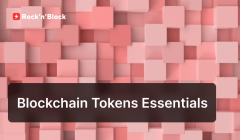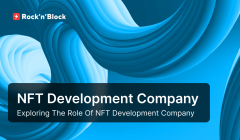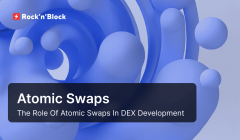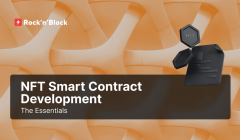Blockchain Tokens Essentials
03 May 2024If you're looking to create a blockchain token, this is your must-read guide, as we delve into the different types that have matured over time and the cutting-edge features that define tokens functionality. In addition, we will explore the benefits of token development for your business.
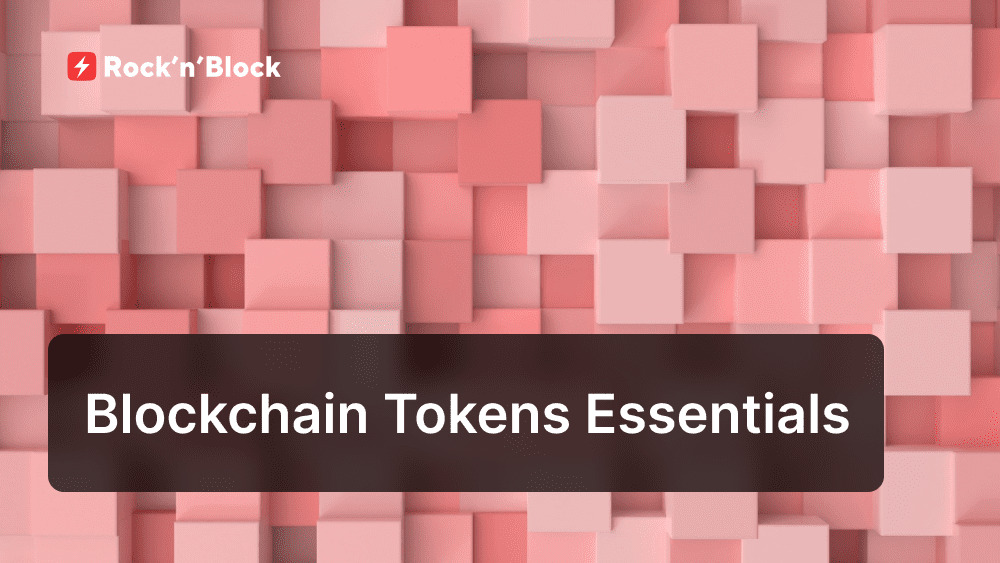
Table of Contents:
-
Blockchain Tokens Essentials
-
Types of Blockchain Tokens
-
Key Features of Blockchain Tokens Development
-
Benefits of Creating a Blockchain Token
-
Conclusion
Blockchain Tokens Essentials
Blockchain tokens are the digital representation of assets or value on a blockchain. They are not just limited to cryptocurrencies. Rather, they encompass a wide range of digital assets.
Blockchain tokens operate on decentralized networks, utilizing cryptography to secure transactions and ensure transparency. Whether it's a utility token granting access to a specific service or a security token representing ownership in an asset, each type plays a distinct role in the blockchain ecosystem.
Explore 10 Key Steps to Create a DeFi Token here!
Understanding the essentials and recognizing the significance of creating your own token positions you at the forefront of innovation.
Types of Blockchain Tokens
Blockchain tokens come in various types, each serving distinct purposes within the decentralized ecosystem. To create a blockchain token you need to understand these types, as it is crucial for navigating the complexities of tokenization. Here's an exploration of the main categories:
Utility Tokens
Utility tokens are perhaps the most common type. They provide users with access to specific functions or services within a blockchain platform. For example, a utility token might grant access to a decentralized application (DApp), allowing users to perform certain actions or obtain particular services. These tokens are integral for facilitating user engagement within a blockchain ecosystem.
Security Tokens
Security tokens represent ownership of real-world assets, such as equities, bonds, or real estate. Unlike utility tokens, security tokens derive their value from external, tradable assets. They are subject to financial regulations, as they essentially digitize and tokenize traditional securities. Security tokens offer a bridge between the traditional financial world and the blockchain space.
Payment Tokens
Payment tokens serve as a medium of exchange within a blockchain network. Their primary function is to facilitate transactions and act as a store of value. Payment tokens are widely recognized as digital currencies and are used for various online transactions.
Learn about Useful Tools and Platforms for Crypto Token Development in our thorough article!
Governance Tokens
Governance tokens grant holders the right to participate in the decision-making processes of a blockchain network. Holders can propose and vote on changes to the network's rules or parameters. These tokens empower users to have a say in the evolution of the blockchain ecosystem, promoting a decentralized and community-driven governance model.
Non-Fungible Tokens (NFTs)
Non-fungible tokens represent unique and indivisible assets, often used to tokenize digital or physical items like art, collectibles, or real estate. NFTs are stored on the blockchain, ensuring proof of ownership and authenticity. They have gained immense popularity in the realm of digital art and NFT gaming platforms development, providing a novel way to represent ownership of unique assets.
Stablecoins
Stablecoins are designed to minimize the volatility typically associated with cryptocurrencies. These tokens are pegged to the value of traditional fiat currencies or other stable assets, providing a more stable medium of exchange. Stablecoins are often used as a bridge between the traditional financial system and the world of cryptocurrencies.
Wrapped Tokens
Wrapped tokens are blockchain tokens that represent other assets, often from different blockchains. These tokens enable cross-chain compatibility and the utilization of assets across different blockchain networks.
Understanding the diverse types of blockchain tokens is essential for anyone looking to navigate the decentralized landscape. Whether you're a developer, investor, or enthusiast, recognizing the nuances of these token types provides valuable insights into the functionality and potential of blockchain technology, especially when considering the process to create a blockchain token.
Key Features of Blockchain Tokens Development
As we explore the key features of blockchain tokens development, we'll delve into the transformative aspects that define this process and highlight the critical elements that contribute to the success of tokenized ecosystems. Let's navigate the landscape of token development and understand how to create a blockchain token with impactful features.
Decentralization and Security
At the core of blockchain token development is the principle of decentralization. When you embark on the journey to create a blockchain token, you are inherently contributing to a decentralized network where no single entity holds absolute control. Decentralization ensures that the token operates on a distributed ledger, enhancing security by mitigating the risks associated with centralized systems. As transactions are recorded across multiple nodes, the blockchain becomes resistant to tampering, providing a secure foundation for the tokenized ecosystem.
Smart Contracts Integration
Smart contracts development is a hallmark feature that elevates the functionality of blockchain tokens. Smart contracts are self-executing contracts with the terms of the agreement directly written into code. When you create a blockchain token, incorporating smart contracts enables automated and trustless execution of predefined conditions. This not only streamlines complex processes but also eliminates the need for intermediaries, fostering efficiency and reliability within the tokenized environment.
Customizability and Flexibility
One of the compelling advantages of token development is the ability to tailor the token to suit specific needs and use cases. As you create a blockchain token, customizability and flexibility become key features. Whether it's adjusting token supply, defining governance structures, or incorporating unique functionalities, the ability to customize the token parameters empowers creators to adapt their digital assets to diverse scenarios. This feature ensures that the blockchain token aligns precisely with the objectives of the project or platform.
Transparency and Immutability
Transparency and immutability are inherent characteristics of blockchain technology, and they play a crucial role in token development. When you create a blockchain token, every transaction is recorded on the blockchain, providing transparent and publicly accessible information. Immutability ensures that once a transaction is added to the blockchain, it cannot be altered or deleted. These features instill trust among users, as they can verify the entire transaction history, promoting accountability and integrity within the tokenized ecosystem.
Dive into approaches and best practices to create robust, secure, and interconnected blockchain tokens: Addressing Key Challenges in Blockchain Token Development!
Benefits of Creating a Blockchain Token
Exploring the benefits of developing blockchain tokens provides insights into how this process can revolutionize various aspects of a project or platform. Let's dive into the key advantages that come with the decision to create a blockchain token.
Enhanced Security and Trust
Security and trust are paramount considerations when venturing into the creation of blockchain tokens. By opting to create a blockchain token, you leverage the inherent security features of blockchain technology. The decentralized and immutable nature of the blockchain ensures that transactions are secure, transparent, and resistant to tampering. This heightened level of security not only protects digital assets but also fosters trust among users, contributing to the credibility of the tokenized ecosystem.
Access to Global Markets
Creating a blockchain token unlocks the gateway to global markets. The decentralized nature of blockchain technology eliminates geographical barriers, allowing businesses to reach a global audience. Tokens, once created, can be traded and accessed by individuals worldwide. This global accessibility not only broadens the market reach but also facilitates international collaboration and investment. The ability to tap into diverse markets enhances the growth potential and relevance of the tokenized project on a global scale.
Liquidity and Fractional Ownership
Liquidity and fractional ownership are transformative benefits that come with the blockchain tokens development. Tokenized assets can be traded on secondary markets, providing liquidity that was traditionally challenging to achieve. Additionally, the divisibility of tokens allows for fractional ownership, enabling individuals to invest in assets that were previously out of reach. This democratization of ownership enhances market liquidity and broadens investment opportunities, creating a more inclusive financial landscape.
Streamlined Business Processes
Blockchain tokens development introduces a layer of efficiency to business processes. Smart contracts, integral to many blockchain tokens, automate and streamline various aspects of operations. Whether it's automating supply chain processes, managing agreements, or executing complex financial transactions, the use of blockchain tokens facilitates streamlined and transparent business operations. This efficiency not only reduces operational costs but also enhances the overall agility and responsiveness of the business.
Conclusion
The benefits of creating blockchain tokens extend far beyond the realm of digital assets. When you choose to create a blockchain token, you are not only embracing enhanced security, lower costs, and global accessibility but also revolutionizing the traditional concepts of ownership and business operations. The advantages of liquidity, fractional ownership, and streamlined processes contribute to a more dynamic and inclusive economic landscape. As businesses and projects explore the potential of blockchain tokenization, these benefits stand as compelling reasons to embark on the journey of token development.
We ❤️ Development
Follow us on social media to receive the hottest blockchain development updates
